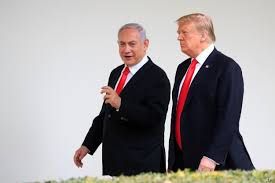
Netanyahu Continues To Use the Trump Administration
(Iran) on 11 December 2020
by Ahmad Kazemzadeh (link to original)
The three months between the presidential election and the incoming president's inauguration in the U.S. are known as the lame duck period.* Generally, no important policies are implemented unless they are related to matters of national security. However, the Donald Trump era seems to be an exception to this rule in that the Trump administration has taken important actions with respect to the interests of the Zionist regime and the ruling coalition led by Benjamin Netanyahu. The forced normalization of relations between the Israeli regime and handpicked nations such as the United Arab Emirates, Bahrain, Sudan and, most recently, Morocco is the most significant of these efforts.
This trend toward normalization started immediately after Trump’s loss in the presidential election became apparent. Netanyahu began using embedded agents in the Trump administration, such as U.S. Secretary of State Mike Pompeo (who should really be called Netanyahu’s secretary of state), in order to maximize Israeli interests. With these moves, Netanyahu is looking to further his personal interests by prolonging his time in office and retaining his immunity as prime minister from liability in connection with a number of corruption charges.
Such actions before and after an election have once again proven that the Trump administration, and specifically Pompeo, have not only placed Israeli national interests over those of the U.S., but that the Trump administration has made Netanyahu’s narrative a priority. To this end, Trump and Pompeo have abandoned the previous U.S. policy of a two-state solution, and have used the U.S. as a tool to further Israeli interests.
It is unknown if the new Joe Biden administration will ignore Netanyahu’s explicit intervention in U.S. domestic issues, or what steps Biden may take to prevent or punish such actions. It is evident that the change of power in the White House will tighten the foreign and domestic political circle around Netanyahu. Unless Netanyahu acts unexpectedly in the time remaining under the Trump presidency to ensure his government’s continuity, the transition of power in the U.S. will likely result in early elections in Israel.
The EU maintains its preference for a two-state solution to the Palestinian problem. Therefore, the Biden administration, whether eagerly or begrudgingly, will have to show cooperation with the EU in this matter. Of course, establishing relations between the Zionist regime and Arab countries in the region has long been a priority for the U.S. and the EU. However, the premise of this goal was to achieve an inclusive peace after the implementation of United Nations resolutions regarding the Israeli withdrawal from occupied territory to the 1967 borders, and the creation of a Palestinian government with its capital in the eastern part of Jerusalem. The Trump administration and the Netanyahu coalition cooperated to change this equation by enticing some Arab countries to normalize relations with Israel. They achieved these agreements by soliciting the help of Saudi Arabia, granting concessions like the sale of F-35 bombers to the UAE, recognition of Morocco’s sovereignty over the disputed territory of Western Sahara, and the adoption of bullying tactics. These agreements may be fragile, as they occurred during the final days of a defeated Trump administration and a collapsing Netanyahu government. Furthermore, history suggests that these agreements have been unpopular domestically.
*Editor’s note: When Congress is in session after a November election and before the beginning of a new Congress, that is known as a “lame-duck session.”


